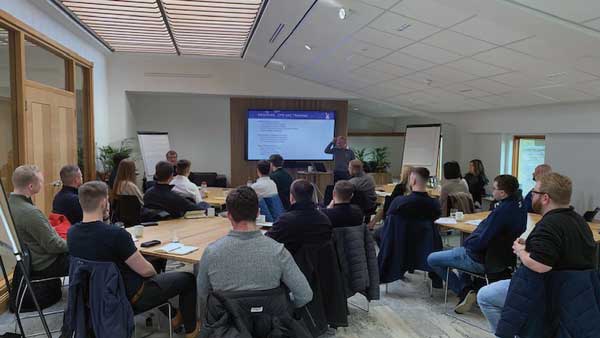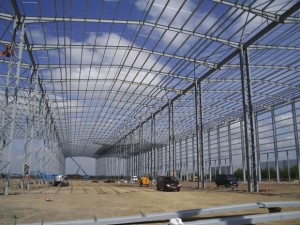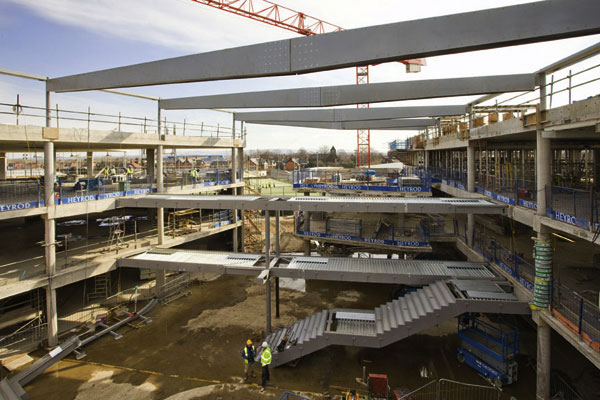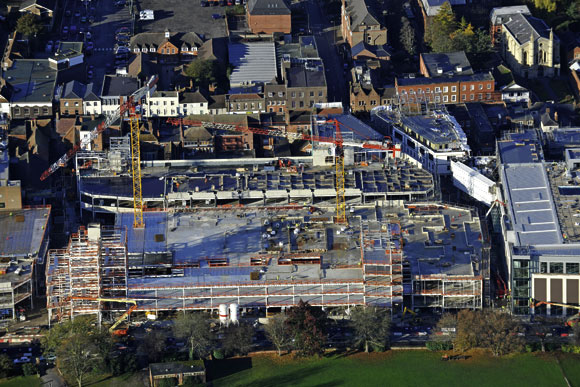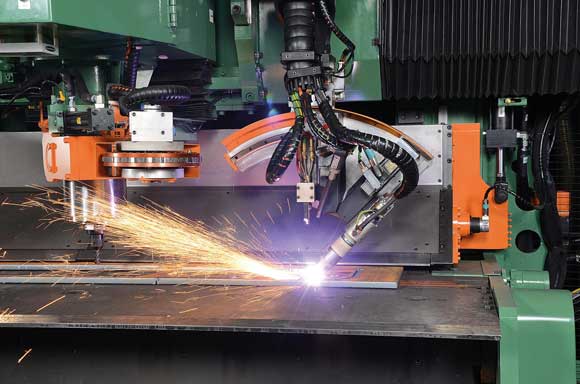Profile
Committee tailored for success
As Chairman of the BCSA’s Marketing and Member Services Committee for 14 years Geoffrey Taylor has had a ringside view of the growth of the association and the phenomenal success of the constructional steelwork sector that accompanied it. He tells Nick Barrett about some of the highlights.
The past twenty years have been a period of unprecedented success for structural steelwork, and the sector can fully justify today’s confidence that the market will continue to respond positively to the winning blend of quality product, service and technical back-up. That is the confident outlook proposed by Geoffrey Taylor, Marketing Director of Caunton Engineering as he hands over the reins as Chairman of the Marketing and Member Services Committee.
As Chairman for 14 years Geoffrey has a better insight than many to what created the success. He remains a committee member and is as passionately committed to steel as he has ever been. He has spent the largest part of his working life in marketing in the constructional steelwork sector, with firms like Watson Steel where he was Sales and Marketing Director, Graham Wood Structural, Tetbury Steel and now Caunton Engineering.
‘The first thing to point out is that although the committee is often referred to as “the marketing committee” our task was not to market steel, but to market the BCSA to steelwork contractors and fabricators,’ says Mr Taylor. Fourteen years ago of course the sector was reeling from the impact of the worst post war recession the construction industry has suffered. Clients themselves were folding, and main contractors as well as specialists were going out of business as recession gripped. The 1980’s was boom time, with steelwork sales reaching 1.4Mt a year – recession slashed that almost overnight to 800,000t. Prices were in freefall – holding prices up meant no work, but cutting them to market levels was commercial suicide for some. Painful times indeed.
‘In the 1980’s a lot of people in the steelwork sector went bust.’ remembers Mr Taylor. ‘But it is noticeable that throughout the 1990’s hardly anyone has gone under among steelwork contractors. We don’t make the old mistakes any longer.
‘We couldn’t force companies to behave in a commercially sensible manner, and in that market even the best advised could still have gone under, but the lessons of the recession were learned and today members seem to be on a much firmer footing.
‘As a result the potential tender list for a steel framed building will be very healthily long, whereas there will be only a very few tenderers to select from for a concrete frame.’

Chek Lap Kok Airport in Hong Kong is one of the many international projects to have been completed by BCSA members (Photos: Dennis Gilbert/VIEW)
Not all steelwork contractors are BCSA members today, but almost all are, which is one mark of the success of the committee. The committee has been responsible for several notable marketing innovations.
Corus’s forerunner British Steel initially developed an increasing interest in construction; the industry had always been a key market for steel but other client industries like coalmining were in structural decline. The committee became a forum where information and ideas could be exchanged with the country’s leading steel manufacturer.
Joint efforts were developed in seminars and advertising which continue to this day. Each of BCSA’s four regions sends a representative to meetings. The committee became a forum for what BCSA membership can do for members, which meant informing the world about the work carried out on behalf of members, like lobbying government and its agencies, representation on technical committees, holding weekend educational seminars, holding an annual national dinner, publishing research, providing health and safety and technical advice. Mr Taylor is particularly proud of the efforts made towards promoting steel to schools and students.
In 1990 the White Book was developed, to list for the benefit of the outside world what member’s capabilities were and what the industry as a whole could achieve for clients. ‘This has been a great success;’ he says. Launching magazines like New Steel Construction to spread the benefits of steel among designers has been another initiative of the committee.
‘Constructional steelwork is now a very efficient, very slick industry. Three-dimensional modelling has spread quickly among members, which shows that we are receptive to advances in technology that increase our productivity and effectiveness. Three-dimensional modelling came of age in 1992 when I started as chairman of the committee, which was a big breakthrough, as was CNC manufacturing. Just in time manufacturing is another major area of progress.
The machines from manufacturers like Kaltenbach, Ficep and Peddinghaus have also been a great help. It costs about £500,000 for just one of these machines today, which is an effective barrier to entry to those who might not be prepared to be there for the long haul. As a result of major investment in all this sort of equipment we have cut lead times in half. We moved from being a craft based to being a high tech industry very quickly.’
Mr Taylor is proud that very few companies that could be members of BCSA fail to recognise the benefits and join. ‘There is no major steelwork contractor today which isn’t a member.
‘At the risk of tempting fate, we can safely say that there are no clouds on the horizon for structural steelwork or the BCSA’s members. Nobody can predict recessions of course, but that would affect the entire construction industry and not the position of the steelwork sector within it.
‘Some 60% of our business is in the industrial sector and this looks rock firm. Our market share has shot up and is at record levels so this is perhaps a good time to take a step back and let someone else take the reins.’
He stresses that he sees the committee as part of the industry’s success story, although he modestly rejects the view that it was a cause of it:’ We have been a supporter of the success, not a leader of it. We have been a forum where some ideas were either first proposed or were discussed and developed.
‘It was an extremely interesting 14 years and I am sure my successor, Andy Holmes of Westok, will be able to report continued success for the constructional steelwork sector after his term of office.’







